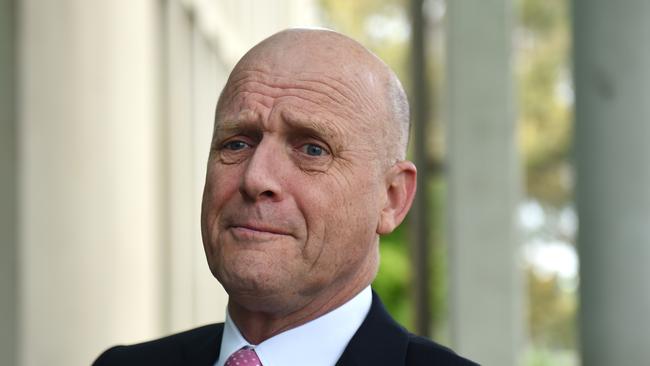Strip control of VCs’ pay from unis: Leyonhjelm
Universities would lose control over the salaries of vice-chancellors under a plan floated by the Liberal Democrat David Leyonhjelm.

Universities would lose control over the salaries of vice-chancellors under a plan floated by Liberal Democrat David Leyonhjelm.
“Australian public universities are crying poor while the average salary package for their vice-chancellors is now almost $900,000,” Senator Leyonhjelm told the HES yesterday.
“Last year 11 of them earned more than $1 million.”
His party plans to introduce amendments to the government’s $2.8 billion higher education savings bill that would give the Remuneration Tribunal control over vice-chancellors’ salaries to ensure they are “financially viable” for the institution.
Already controversial, the high salaries of university chiefs have been seized on by Education Minister Simon Birmingham in his political struggle with the sector.
University of Sydney chief Michael Spence topped last year’s list with a $1.4m salary package.
Senator Birmingham’s bill is listed for debate in the Senate today, although observers suspect it may not be brought on in the absence of a deal with crossbenchers and amid the pressing claims of other government business.
Last month the HES reported the first study to track vice-chancellors’ pay against league tables such as the Good Universities Guide and the Shanghai-based Academic Ranking of World Universities.
The author of the study, Gregory Pazmandy, an accounting academic at the University of Technology Sydney, said Australia had “the highest paid vice-chancellors in the world”, but he could not find any statistical link between the rankings performance of their institutions and their level of compensation.
Senator Leyonhjelm said: “These public universities are not publicly listed companies. We cannot point to profits or stock prices to show that these people are worth what they are paid.
“If these academic senior managers had to survive in the private sector they would be hard-pushed attracting $1m-plus salaries.”
Sector commentators say populist attacks on vice-chancellors’ pay are a device to make university funding cuts appear justified. Universities Australia chief executive Belinda Robinson was surprised to see a senator with a deregulationist political ideology calling for more regulation.
“Let’s not forget this party’s policies are to privatise every university in Australia, decimate our future skilled workforce, savage $28 billion of export income and slam the door of opportunity on the majority of young Australians,” she said.
Senator Birmingham said university leaders deserved to be rewarded for their skills but salaries had to be in line with community expectations.
“Vice-chancellor salaries have attracted a lot of attention in recent months because Australians understand they foot the bill for around 58 per cent of university revenue on average,” Senator Birmingham said.
“University autonomy is a key feature of Australian higher education but autonomy should not mean that universities can ignore the social license taxpayers give them to operate.”
Senator Leyonhjelm took credit for government interest in graduate employment outcomes as one metric to allocate 7.5 per cent or $500m a year in university teaching subsidies.
“The universities at the moment have no incentive to take an interest in the employability of their students,” he said.
“One of the small things that I have achieved is that I’ve got Simon Birmingham’s department to focus on that, so they’re now talking about that in the context of university funding.”
He said he had begun lobbying when Christopher Pyne was minister, and the issue had taken on momentum under Senator Birmingham. The minister said there had been “a number of strong ideas” put up during a year-long process of consultation on higher education policy.
Ms Robinson said the performance funding plan would put another $1.9bn from university budgets at risk over four years — on top of the proposed $1.1bn in cuts to base funding — to create a “large discretionary political slush fund”.
“This scheme is likely to have the greatest impact on those universities that serve our most disadvantaged students and communities. It would also hand unprecedented and sweeping new powers to current and future ministers to impose conditions over a large portion of university base funding — and remove the authority of the senate.
“Senators are being asked to hand every future education minister carte blanche to impose new funding conditions on a whim — without needing to consult universities or students nor to seek senate approval.
“And what’s next? A push to withhold funding from high schools based on school-leaver job statistics?”


